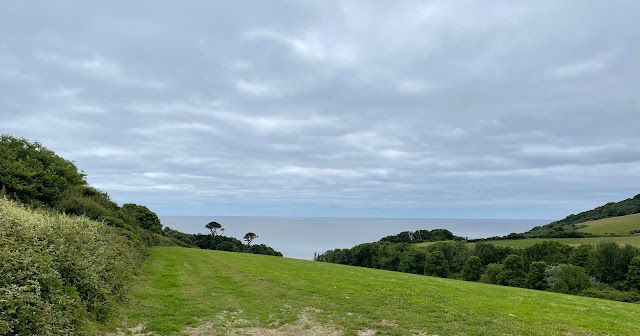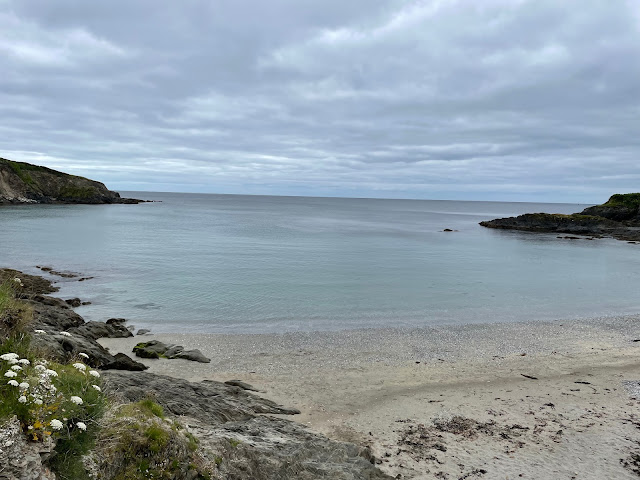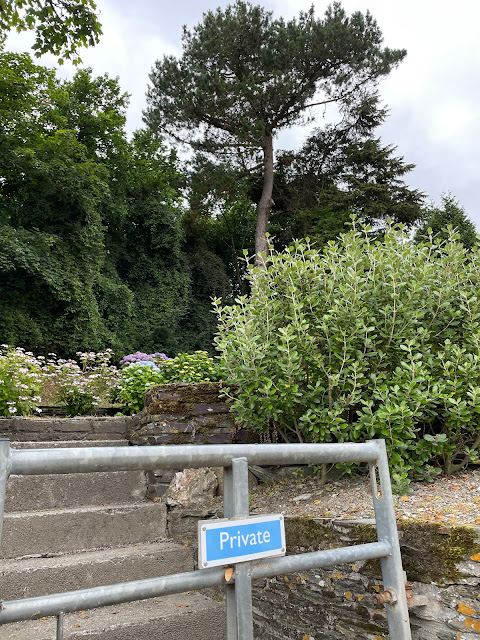 |
| Overlooking Peel Cove, near Menabilly |
 |
| The narrow path to Menabilly |
. . . I would seize every opportunity to explore, to walk for miles – bluebells everywhere – or cross the ferry to Fowey, walk through the town . . . and one day looking north, inland from the Gribben, I could just make out the grey roof of a house set in its own grounds in the midst of the trees.
That would be Menabilly, I was told. Belongs to Dr. Rashleigh, but he seldom lives there. Apparently the property had been first built in the reign of Queen Elizabeth, the grounds and woods had been in the last century famous for their beauty, and the property had never changed hands from the time it came into being, but had passed down, in the male line to the present owner [Enchanted Cornwall, p. 117].We passed Tregaminion Church before finding a car park on the grounds near a beach where Peter waited patiently as Cath and I plunged down an unlabeled path leading down about ¾ of a mile through the woods. We weren’t sure if we were trespassing or not but we knew the current owners did not want visitors and do not allow the house to be photographed. We saw a lodge but there was no glimpse of Manderley through the trees and just as we were getting very tired of walking, we encountered a young woman with a dog. She said there was nothing to see but that we were going in the right direction so we continued. After a while, we started getting glimpses of the sea and finally emerged at stunning Polridmouth Cove, which would have been Daphne’s private beach during the 25 years she rented Menabilly. Once we reached the cove we met several other inquisitive types who warned us the house was not visible. We surveyed steps that were barred with a “private” sign.
 |
| Polridmouth Cove, Daphne's private beach |
The lodge was deserted. No one peered at us from the windows. We slunk away down the drive, and were soon hidden by the trees. I remember we did not talk, or if we did we talked in whispers. That was the first effect the woods had upon both of us. The trees grew taller and the shrubs more menacing. Yet still the drive led on, and never a house at the end of it . . . “I don’t like it,” said Angela firmly. “Let’s go home.”
Daphne continued to explore the grounds illicitly and eventually found her way up to the house. In 1937, she was living in Alexandria where her husband was stationed when she began writing Rebecca. She was homesick and wanted to set a book in Cornwall and used the mysterious house. Later, in 1943, when she heard the house was being sold, she asked her lawyer to inquire about a lease and got one, although Menabilly was then in bad shape and full of rats, not to mention no heat or lighting.“But the house,” I said with longing, “we haven’t seen the house.” She hesitated, and I dragged her on. But in an instant the day was gone from us. The drive was a muddied path leading nowhere, and the shrubs, green no longer but a shrouding black, turned to fantastic shapes and sizes. There was not one owl now, but twenty. Ad through the dark trees, with a pale grin upon his face, came the first glimmer of the livid hunter’s moon.
I knew then that I was beaten. For that night only.
“All right,” I said grudgingly, “we’ll find the house another time.”
And, following the moon’s light, we struck through the trees and came out upon the hillside. In the distance below us stretched the sea. Behind us the woods and the valley through which we had come. But nowhere was there a sign of any house. Nowhere at all [Enchanted Cornwall, p. 119-20].
Polridmouth Cove
 |
| The steps to Menabilly/Manderley; I guess you can't blame them! |
 |
| Menabilly, copyright British Heritage |
 |
| Fowey Harbor |
 |
| Fowey Harbor |




I enjoyed my journey through Cornwall with you! Your mention of the port of Fowey (pronounced Foy) brought back a memory of a poem I learnt at school on the vagaries of English spelling. I thought you would enjoy this, so attach below:
ReplyDeleteThe Harbour of Fowey by Sir Arthur Thomas Quiller-Couch
O THE Harbour of Fowey
Is a beautiful spot,
And it's there I enjowey
To sail in a yot;
Or to race in a yacht
Round a mark or a buoy —
Such a beautiful spacht
Is the Harbour of Fuoy!
But the wave mountain-high,
And the violent storm,
Do I risk them? Not Igh!
But prefer to sit worm
With a book on my knees
By the library fire,
While I list to the brees
Rising hire and hire.
And my leisure's addressed
To composing of verse
Which, if hardly the bessed,
Might be easily werse.
And, the spelling I use
Should the critics condemn,
Why, I have my own vuse
And I don't think of themn.
Yes, I have my own views:
But the teachers I follow
Are the Lyrical Miews
And the Delphic Apollow.
Unto them I am debtor
For spelling and rhyme,
And I'm doing it bebtor
And bebtor each thyme.
Gorgeous photos!!! I'd love to go to Cornwall someday. :)
ReplyDeleteWe did go to Jamaica Inn but just looked at the outside and decided not to go in with our two small boys. We could hardly see the building for all the floral hanging baskets, very chocolate boxy, but the moor was good.
ReplyDeleteAnother wonderful post and it was especially nice to see and hear about the connections to du Maurier's books. It all looks so nice and real, not terribly touristy.
ReplyDeleteMichelle, belated thanks for the charming poem! You probably know that Quiller-Couch was du Maurier's mentor and helped her get published. She had connections to the art world so probably would have been successful eventually.
ReplyDeleteKatrina, I knew Jamaica Inn was touristy (the exact opposite of Manderley) but another time I still think I would like to see it. Maybe I will reread the book next spring.
Tracy, some of the ocean and cliff views reminded me of Maine or Gloucester, MA - they were so beautiful. I am trying to remember if I have seen the California coast. I guess in San Diego where my college roommate lives but it is not the same.